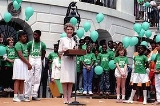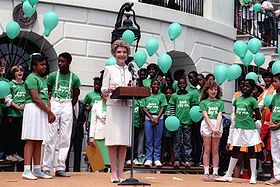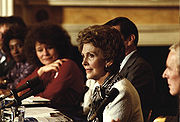
Just Say No
Encyclopedia

Advertising
Advertising is a form of communication used to persuade an audience to take some action with respect to products, ideas, or services. Most commonly, the desired result is to drive consumer behavior with respect to a commercial offering, although political and ideological advertising is also common...
campaign, part of the U.S.
United States
The United States of America is a federal constitutional republic comprising fifty states and a federal district...
"War on Drugs
War on Drugs
The War on Drugs is a campaign of prohibition and foreign military aid and military intervention being undertaken by the United States government, with the assistance of participating countries, intended to both define and reduce the illegal drug trade...
", prevalent during the 1980s and early 1990s, to discourage children from engaging in recreational drug use
Recreational drug use
Recreational drug use is the use of a drug, usually psychoactive, with the intention of creating or enhancing recreational experience. Such use is controversial, however, often being considered to be also drug abuse, and it is often illegal...
by offering various ways of saying no. Eventually, this also expanded the realm of "Just Say No" to violence
Violence
Violence is the use of physical force to apply a state to others contrary to their wishes. violence, while often a stand-alone issue, is often the culmination of other kinds of conflict, e.g...
and premarital sex
Premarital sex
Premarital sex is sexual activity, including vaginal intercourse, oral sex, and anal sex, practiced by persons who are unmarried. Although it has always been practiced, in the West it has increased in prevalence since the mid-1950s...
. The slogan was created and championed by First Lady
First Lady of the United States
First Lady of the United States is the title of the hostess of the White House. Because this position is traditionally filled by the wife of the president of the United States, the title is most often applied to the wife of a sitting president. The current first lady is Michelle Obama.-Current:The...
Nancy Reagan
Nancy Reagan
Nancy Davis Reagan is the widow of former United States President Ronald Reagan and was First Lady of the United States from 1981 to 1989....
during her husband's presidency.
Initiation
The campaign emerged from a substance abuse prevention program supported by the National Institutes of HealthNational Institutes of Health
The National Institutes of Health are an agency of the United States Department of Health and Human Services and are the primary agency of the United States government responsible for biomedical and health-related research. Its science and engineering counterpart is the National Science Foundation...
, pioneered in the 1970s by University of Houston
University of Houston
The University of Houston is a state research university, and is the flagship institution of the University of Houston System. Founded in 1927, it is Texas's third-largest university with nearly 40,000 students. Its campus spans 667 acres in southeast Houston, and was known as University of...
Social Psychology Professor Dr. Richard I. Evans. Evans's social inoculation model included teaching student skills to resist peer pressure and other social influences. The campaign involved University projects done by students across the nation. Jordan Zimmerman, a student at USF
University of South Florida
The University of South Florida, also known as USF, is a member institution of the State University System of Florida, one of the state's three flagship universities for public research, and is located in Tampa, Florida, USA...
, won the campaign. Zimmerman is the founder of Zimmerman Advertising, the 15th largest advertising corporation in the United States. The anti-drug movement was among the resistance skills recommended in response to low peer pressure, and Nancy Reagan's larger campaign proved to be a useful dissemination of this social inoculation strategy.
Mrs. Nancy Reagan first became involved during a campaign trip in 1980 to Daytop
Daytop
Daytop, or Daytop Village, is a drug addiction treatment organization with facilities in New York and New Jersey. It was founded in 1963 by Dr. Daniel Casriel M.D along with Monsignor William B. O'Brien a Roman Catholic priest and founder and the president of the World Federation of Therapeutic...
Village, New York
New York
New York is a state in the Northeastern region of the United States. It is the nation's third most populous state. New York is bordered by New Jersey and Pennsylvania to the south, and by Connecticut, Massachusetts and Vermont to the east...
. She recalls feeling impressed by a need to educate the youth about drugs and drug abuse. Upon her husband's election to the presidency, she returned to Daytop Village and outlined how she wished to help educate the youth. She stated in 1981 that her best role would be to bring awareness about the dangers of drug abuse:
"Understanding what drugs can do to your children, understanding peer pressure and understanding why they turn to drugs is... the first step in solving the problem."
Efforts in the United States and abroad

Nancy Reagan was asked about her efforts in the campaign, and said: "If you can save just one child, it's worth it." She traveled throughout the United States and several other nations, totaling over 250000 miles (402,335 km). Mrs. Reagan visited drug rehabilitation
Drug rehabilitation
Drug rehabilitation is a term for the processes of medical or psychotherapeutic treatment, for dependency on psychoactive substances such as alcohol, prescription drugs, and so-called street drugs such as cocaine, heroin or amphetamines...
centers and abuse prevention programs; with the media attention that the first lady receives, Nancy appeared on television talk shows, recorded public service announcements, and wrote guest articles. By the autumn of 1985, she had appeared on 23 talk shows, cohosted an October 1983 episode of Good Morning America
Good Morning America
Good Morning America is an American morning news and talk show that is broadcast on the ABC television network; it debuted on November 3, 1975. The weekday program airs for two hours; a third hour aired between 2007 and 2008 exclusively on ABC News Now...
, and starred in a two hour PBS documentary on drug abuse. The campaign and the phrase "Just Say No" made their way into popular American culture when TV shows like Diff'rent Strokes
Diff'rent Strokes
Diff'rent Strokes is an American television sitcom that aired on NBC from November 3, 1978 to May 4, 1985, and on ABC from September 27, 1985 to March 7, 1986...
and Punky Brewster
Punky Brewster
Punky Brewster was an American sitcom about a girl named Punky Brewster being raised by her foster parent...
produced episodes centered on the campaign. In 1983, Nancy Reagan appeared as herself in the television programs Dynasty
Dynasty (TV series)
Dynasty is an American prime time television soap opera that aired on ABC from January 12, 1981 to May 11, 1989. It was created by Richard & Esther Shapiro and produced by Aaron Spelling, and revolved around the Carringtons, a wealthy oil family living in Denver, Colorado...
and Diff'rent Strokes to garner support for the anti-drug campaign. She participated in a 1985 rock music video "Stop the Madness
Stop the Madness
"Stop the Madness" is an anti-drug music video uniquely endorsed and supported by United States President Ronald Reagan and the Reagan administration in 1985...
" as well. La Toya Jackson
La Toya Jackson
La Toya Yvonne Jackson is an American singer-songwriter, musician, author, television personality, actress, businesswoman, philanthropist, activist and former model. She is the fifth child of the Jackson family...
became spokesperson for the campaign in 1987 and recorded a song entitled "Just Say No" with British hit producers Stock/Aitken/Waterman
Stock Aitken Waterman
Stock Aitken Waterman, sometimes known as SAW, were a UK songwriting and record producing trio consisting of Mike Stock, Matt Aitken and Pete Waterman. They had great success during the mid to late 1980s and early 1990s...
.
In 1985, Nancy Reagan expanded the campaign internationally. She invited the First Ladies
First Lady
First Lady or First Gentlemanis the unofficial title used in some countries for the spouse of an elected head of state.It is not normally used to refer to the spouse or partner of a prime minister; the husband or wife of the British Prime Minister is usually informally referred to as prime...
of thirty various nations to the White House in Washington, D.C. for a conference entitled the "First Ladies Conference on Drug Abuse". She later became the first First Lady invited to address the United Nations
United Nations General Assembly
For two articles dealing with membership in the General Assembly, see:* General Assembly members* General Assembly observersThe United Nations General Assembly is one of the five principal organs of the United Nations and the only one in which all member nations have equal representation...
.
She enlisted the help of the Girl Scouts of the United States of America, Kiwanis Club International, and the National Federation of Parents for a Drug-Free Youth to promote the cause; the Kiwanis put up over 2000 billboards with Nancy Reagan's likeness and the slogan. Over 5000 Just Say No clubs were founded in schools and youth organizations in the United State and abroad. Many clubs and organizations remain in operation around the country, where they aim to educate children and teenagers about the effects of drugs.
Just Say No crossed over to the United Kingdom
United Kingdom
The United Kingdom of Great Britain and Northern IrelandIn the United Kingdom and Dependencies, other languages have been officially recognised as legitimate autochthonous languages under the European Charter for Regional or Minority Languages...
in the 1980s, where it was popularized by the BBC
BBC
The British Broadcasting Corporation is a British public service broadcaster. Its headquarters is at Broadcasting House in the City of Westminster, London. It is the largest broadcaster in the world, with about 23,000 staff...
's 1986 "Drugwatch" campaign, which revolved around a heroin-addiction
Substance dependence
The section about substance dependence in the Diagnostic and Statistical Manual of Mental Disorders does not use the word addiction at all. It explains:...
storyline in the popular children's TV drama serial Grange Hill. The cast's cover of the original U.S. campaign song, with an added rap, reached the UK top ten.
Effects
Evidence shows drug use and abuse significantly declined during the Reagan presidency. According to research conducted by the Institute for Social Research at the University of MichiganUniversity of Michigan
The University of Michigan is a public research university located in Ann Arbor, Michigan in the United States. It is the state's oldest university and the flagship campus of the University of Michigan...
, fewer young people in the 1980s were using drugs. High school seniors using marijuana dropped from 50.1% in 1978 to 36% in 1987, to 12% in 1991 and the percentage of students using other drugs decreased similarly. Psychedelic drug
Psychedelic drug
A psychedelic substance is a psychoactive drug whose primary action is to alter cognition and perception. Psychedelics are part of a wider class of psychoactive drugs known as hallucinogens, a class that also includes related substances such as dissociatives and deliriants...
use dropped from 11% to 6%, cocaine
Cocaine
Cocaine is a crystalline tropane alkaloid that is obtained from the leaves of the coca plant. The name comes from "coca" in addition to the alkaloid suffix -ine, forming cocaine. It is a stimulant of the central nervous system, an appetite suppressant, and a topical anesthetic...
from 12% to 10%, and heroin from 1% to 0.5%.
Nancy Reagan's related efforts increased public awareness of drug use, but a direct relationship between reduced drug use and the Just Say No campaign cannot be established.
The campaign drew some criticism, including that the program was too costly. Author Jeff Elliott stated that the Reagan administration's synonymous use of the terms "drug use" and "drug abuse" was improper, and that drug use in America was underestimated; Dr. Michael Newcomb claimed that there is "no evidence that most people who experiment with drugs get hooked." It was also argued that the program did not go far enough in addressing many social issues including unemployment
Unemployment
Unemployment , as defined by the International Labour Organization, occurs when people are without jobs and they have actively sought work within the past four weeks...
, poverty
Poverty
Poverty is the lack of a certain amount of material possessions or money. Absolute poverty or destitution is inability to afford basic human needs, which commonly includes clean and fresh water, nutrition, health care, education, clothing and shelter. About 1.7 billion people are estimated to live...
, and family dissolution; Nancy Reagan's approach to promoting drug awareness was also labeled simplistic by critics who argued that the solution was reduced to a catch phrase.
See also
- Winners Don't Use DrugsWinners Don't Use DrugsWinners Don't Use Drugs is an anti-drug slogan that was included on all arcade games imported into North America for 11 years from 1989—2000. The slogan appears on a screen that is shown during a game's attract mode....
- Above The InfluenceAbove the InfluenceAbove the Influence is an advertising campaign of the National Youth Anti-Drug Media Campaign conducted by the Office of National Drug Control Policy in the United States that includes broad messaging to focus on substances most abused by teens, and delivers both broad prevention messaging at the...
- Drug Abuse Resistance EducationDrug Abuse Resistance EducationDrug Abuse Resistance Education, better known as DARE, is an international education program that seeks to prevent use of controlled drugs, membership in gangs, and violent behavior. D.A.R.E., which has expanded globally since its founding in 1983, is a demand-side drug control strategy of the U.S....
- Virginity pledgeVirginity pledgeVirginity pledges are commitments made by teenagers and young adults to refrain from sexual intercourse until marriage.They are most common in the United States, especially among Catholic and Evangelical Christian denominations....
External links
- First Lady Nancy Reagan and Just Say No
- First Lady Nancy Reagan throws out the first pitch at the 1988 World Series for Just Say No
- Example of Just Say No in popular culture, by LaToya Jackson
http://www.facebook.com/pages/Just-say-no-to-drugs/164320250299083?sk=wall

